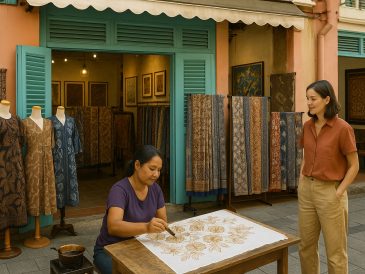Singaporeans and visitors alike enjoy a hyper‑connected lifestyle. You can pay for kopi with a QR code, book a dinner table via an app, and watch hawker‑centre reviews on your phone between stops on the MRT. This seamless digital experience extends to gaming: travellers and locals often ask whether a Singapore online casino app exists for leisure on the go. To answer that question thoughtfully, it helps to understand the city‑state’s high mobile penetration, cashless payment adoption, and strict gambling regulations. This article explores how mobile casino apps fit into Singapore’s digital landscape, what features to expect from such services, and how to choose responsibly, drawing on authoritative reports about digital usage and payment preferences, as well as recent updates on gambling regulation and enforcement.
Singapore’s Digital Landscape: Mobile Connectivity and Lifestyle
Few countries are as digitally connected as Singapore. A 2025 digital report notes that the island republic has a mobile penetration rate of 179%, with 10.5 million mobile connections in a population of about 5.85 million. Singaporeans benefit from some of the world’s most dependable mobile networks, backed by nationwide 5G rollouts and government‑supported smart city initiatives. Internet penetration stands at roughly 95.8%, with 5.61 million internet users. Social media accounts number around 5.16 million, highlighting how deeply digital services are woven into daily routines.
Mobile phones are central to this lifestyle. Around 94.6% of users access the web via mobile devices. A typical Singaporean spends about six and a half hours online each day, splitting time evenly between mobile and desktop devices. This even divide suggests that residents are comfortable switching between screens for work, communication, entertainment, and payments. Whether they’re checking public transport schedules, ordering food, or managing their finances, people seldom leave home without their smartphones. Such behaviour makes the prospect of playing games on a mobile casino app feel natural, especially when travelling around places like Kampong Gelam, Chinatown, or Marina Bay.
Rise of Cashless Payments and Mobile Wallets
Singapore’s move toward a cashless society underpins the appeal of mobile gaming. A 2024 media release by accounting software company Xero found that over three‑quarters of Singapore consumers (76%) use credit or debit cards for payments. More than half rely on PayNow transfers (55%) or bank transfers (also 55%), while about a fifth use the e‑wallet GrabPay (22%) and buy‑now‑pay‑later platforms (21%). The study revealed that 30% of consumers only carry their mobile phones when shopping, compared to 21% globally. Younger generations are even more enthusiastic: 68% of Generation Z prefer to pay with PayNow, and roughly 29% use GrabPay.
This shift is driven by supportive government policies and strong financial infrastructure. Initiatives like PayNow and SGQR (Singapore’s unified QR code standard) make it easy to transfer money instantly between banks and e‑wallets. The government’s Smart Nation vision encourages businesses to adopt digital payments and reduces reliance on cash. As a result, many merchants no longer accept physical currency, yet 79% of consumers still use cash for some transactions. Businesses that fail to offer preferred payment options risk losing customers: 18% of consumers say they would patronise another business if their preferred payment method isn’t available. For mobile casino apps, accommodating a range of payment methods, PayNow, PayLah!, GrabPay, or even card payments, is essential to meet user expectations.
Small businesses are also embracing digital payments. The same Xero report found that nearly nine in ten Singapore small businesses (87%) saw benefits from adopting new payment methods in the past 6–12 months, with advantages like faster payment collection (43% reported reduced time to be paid), improved customer retention (42%), and increased sales (41%). This broader acceptance of cashless solutions means that mobile casino operators can integrate with local payment ecosystems to provide quick deposits and withdrawals.
Regulation and Enforcement: A Strict Framework
Before downloading any gambling app, it’s vital to recognise that Singapore maintains strict controls over remote gambling. Under the Gambling Control Act and related legislation, it is illegal to provide unlicensed gambling services in or from Singapore. The Gambling Regulatory Authority (GRA) oversees licensing and enforcement. Only Singapore Pools, the state‑owned betting operator, is authorised to offer legal online sports betting and lottery services. The city‑state’s two integrated resorts at Marina Bay Sands and Resorts World Sentosa operate under separate casino licences.
Enforcement has intensified in recent years. In January 2025, the GRA announced that the Singapore Police Force would take over blocking illegal gambling websites. Since 2015, authorities have blocked more than 3,800 such sites and halted over 145,000 payment transactions, worth around SGD 37 million. These actions underscore the government’s zero‑tolerance stance on unlicensed operators and highlight the risk of using offshore gambling apps. Travellers should be aware that while playing casual games on a mobile device is legal, placing bets with unlicensed operators could lead to fines or penalties.
What to Expect from Mobile Casino Apps
Assuming you choose to engage with gaming apps, it’s helpful to know what they typically offer. Most mobile casinos aim to recreate the casino experience on a smaller screen. Here are common features:
- Game Variety – Mobile apps usually include hundreds of slot machines, with themes ranging from ancient Egypt to futuristic sci‑fi. Table games such as blackjack, roulette, baccarat, and poker are often available in electronic and live‑dealer formats. Live dealer games stream a real croupier via high‑definition video and enable interaction through chat functions.
- Sports and E‑Sports Betting – Some platforms incorporate sports betting alongside casino games, offering markets on football, basketball, cricket, tennis, and e‑sports titles like Dota 2 or League of Legends. Markets may include match winners, handicaps, totals, and player props.
- User Interface – A well‑designed app should load quickly, present clear menus, and allow seamless switching between games. Look for apps that optimise for Singapore’s varied screen sizes, whether you use a large smartphone or a compact device.
- Payment Integration – With digital wallets dominating everyday spending, top apps integrate local methods. Expect to see PayNow, PayLah!, GrabPay, and card payments in the cashier section. Some international apps may also accept cryptocurrencies like Bitcoin or stablecoins, though these remain niche and unregulated.
- Bonuses and Promotions – Promotions may include welcome matches, reload bonuses, free spins, or cashback on losses. Always read the terms and conditions, particularly wagering requirements, expiry dates, and maximum bet limits. Because remote gambling is unlicensed, consumer protections vary widely.
- Security and Fairness – Reputable apps use SSL encryption, two‑factor authentication (2FA), and independent auditors to certify that game outcomes are random. They may also provide responsible gambling tools such as deposit limits, time‑outs, and self‑exclusion.
Choosing the Right App: Key Factors
If you still wish to explore a mobile casino app, consider the following factors before registering:
- Licensing – Check whether the operator holds a licence from a respected jurisdiction (e.g., Malta, Gibraltar, Isle of Man). Singapore does not issue licences for remote casino gaming, so any legal recourse will be limited. For a fully legal alternative within Singapore, Singapore Pools offers online betting and lotteries under a state licence.
- User Experience – Download the app from a trusted source (official website or app store) and ensure it is compatible with your device. Read user reviews for feedback on performance, customer support, and withdrawal speed.
- Payment Methods – Choose an app that supports your preferred payment method. PayNow and GrabPay provide instant, fee‑free transfers, while cards may incur foreign currency fees. Avoid apps that require unfamiliar payment systems or ask for unusual information.
- Responsible Gambling Tools – Look for features that allow you to set daily or weekly deposit limits, schedule reminders, or self‑exclude. Playing on a mobile device can make it easy to lose track of time, so safeguards are essential.
- Customer Support – 24/7 support via live chat, email, or phone is important. Response times and language options (English, Mandarin, Malay, Tamil) can affect your experience.
- Data Privacy – Review the app’s privacy policy to see how your data will be used. Choose platforms that adhere to data protection standards and do not sell user information to third parties.
Responsible Gaming and Cultural Considerations
Singaporeans are keen travellers within their own city. Visiting Kampong Gelam, for instance, is a feast for the senses, with its colourful shophouses, street art, boutiques, and aromatic Malay cuisine. While a mobile game can provide entertainment on public transport or during a break, it’s important not to let it detract from real‑world experiences. Here are some tips to keep gaming in balance:
- Set Time Limits – Decide in advance how much time you’ll spend on a gaming app each day. With average daily online time already topping six and a half hours, adding extra gaming could lead to digital fatigue.
- Budget Carefully – Only gamble with money you can afford to lose. Use the budgeting tools in your e‑wallet to separate gaming funds from travel expenses. Remember that unlicensed operators offer little recourse if disputes arise.
- Prioritise Local Experiences – Immersing yourself in Singapore’s heritage areas, museums, and parks can be more fulfilling than spinning slots on a phone. Put the device away when exploring the murals along Haji Lane or sampling nasi lemak at the hawker centre.
- Stay Within the Law – Don’t assume that because a site is accessible from your phone, it is legal. Remote gambling without a licence remains illegal in Singapore. Only participate in legal, regulated offerings like the Singapore Pools platform or physical casino resorts.
- Seek Support if Needed – If gambling stops being fun or begins to affect your finances or relationships, seek help. The National Council on Problem Gambling (NCPG) provides resources and helplines for those who need guidance.
Looking Ahead: Digital Innovation and Future Trends
Singapore’s Smart Nation ambitions will continue to expand digital services. As 5G networks mature, new technologies such as augmented reality (AR) and virtual reality (VR) may enhance mobile gaming experiences. Biometric payments like fingerprint or facial recognition, already anticipated by around 36% of small businesses, could simplify account authentication and reduce fraud. However, the government’s commitment to responsible gambling suggests that regulations will remain tight. Enforcement actions, such as blocking thousands of illegal sites and intercepting hundreds of thousands of transactions, are likely to continue, protecting consumers but limiting the growth of unlicensed services.
On the consumer side, digital wallets and PayNow are poised to become even more entrenched. The fact that nearly a third of consumers carry only their phones when shopping indicates that mobile payments are becoming the default. For legitimate gaming operators, integrating with these local systems will be key to winning trust and convenience. For travellers and locals, the challenge lies in balancing digital entertainment with mindful, law‑abiding choices.
Conclusion
Singapore’s pervasive connectivity, high mobile penetration, and enthusiastic adoption of cashless payments make the idea of a mobile casino app appealing on the surface. Yet the reality is shaped by a strict legal framework that permits remote gambling only under a state license. For those curious about such apps, understanding the regulatory environment, choosing reputable operators, and using responsible gambling tools are paramount. While the technology is impressive and the convenience undeniable, visitors to Kampong Gelam and other neighbourhoods might find richer rewards in the city’s culture, food, and history than in a virtual slot machine. By staying informed and mindful, you can enjoy the best of Singapore, online and offline.




